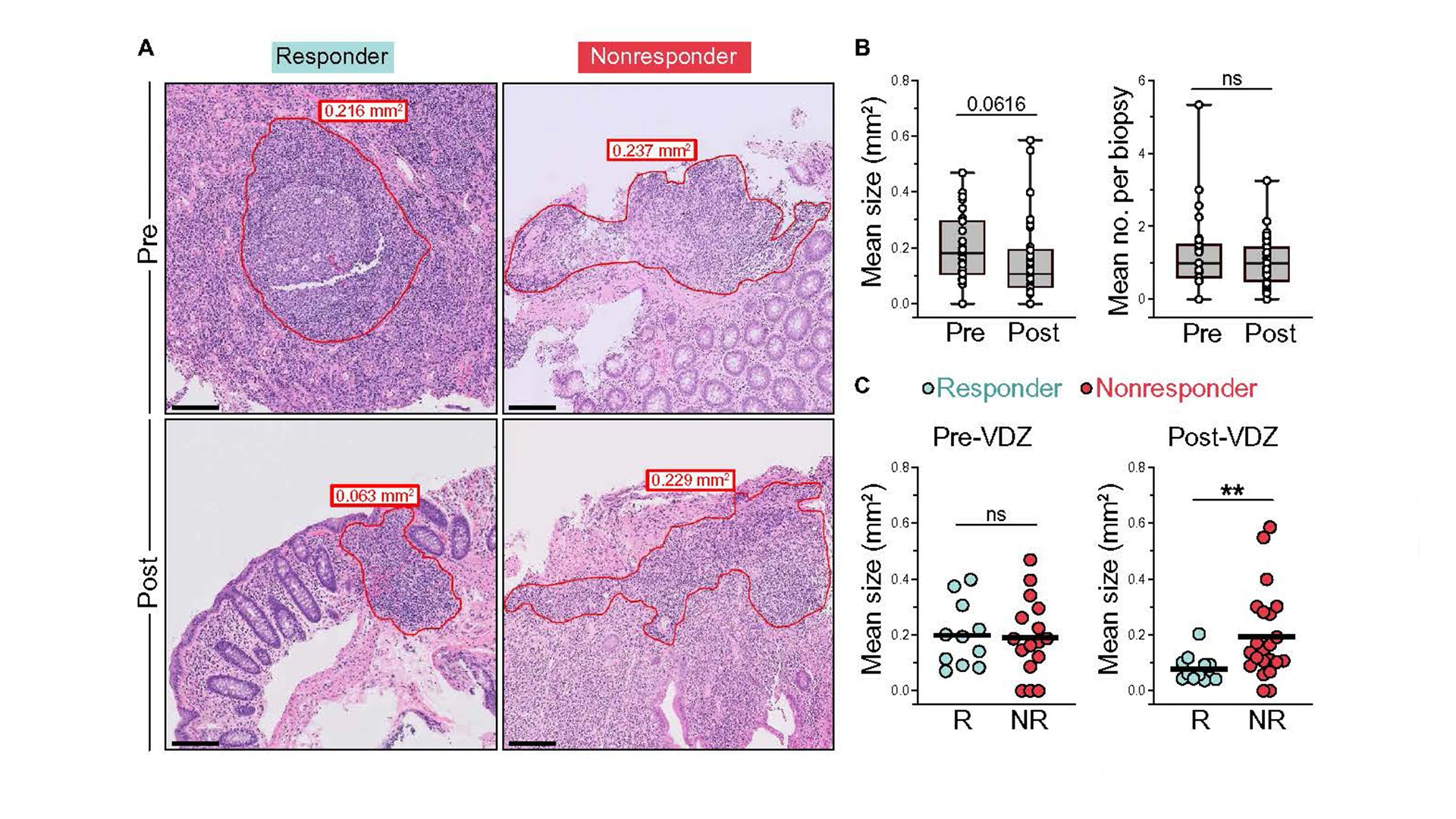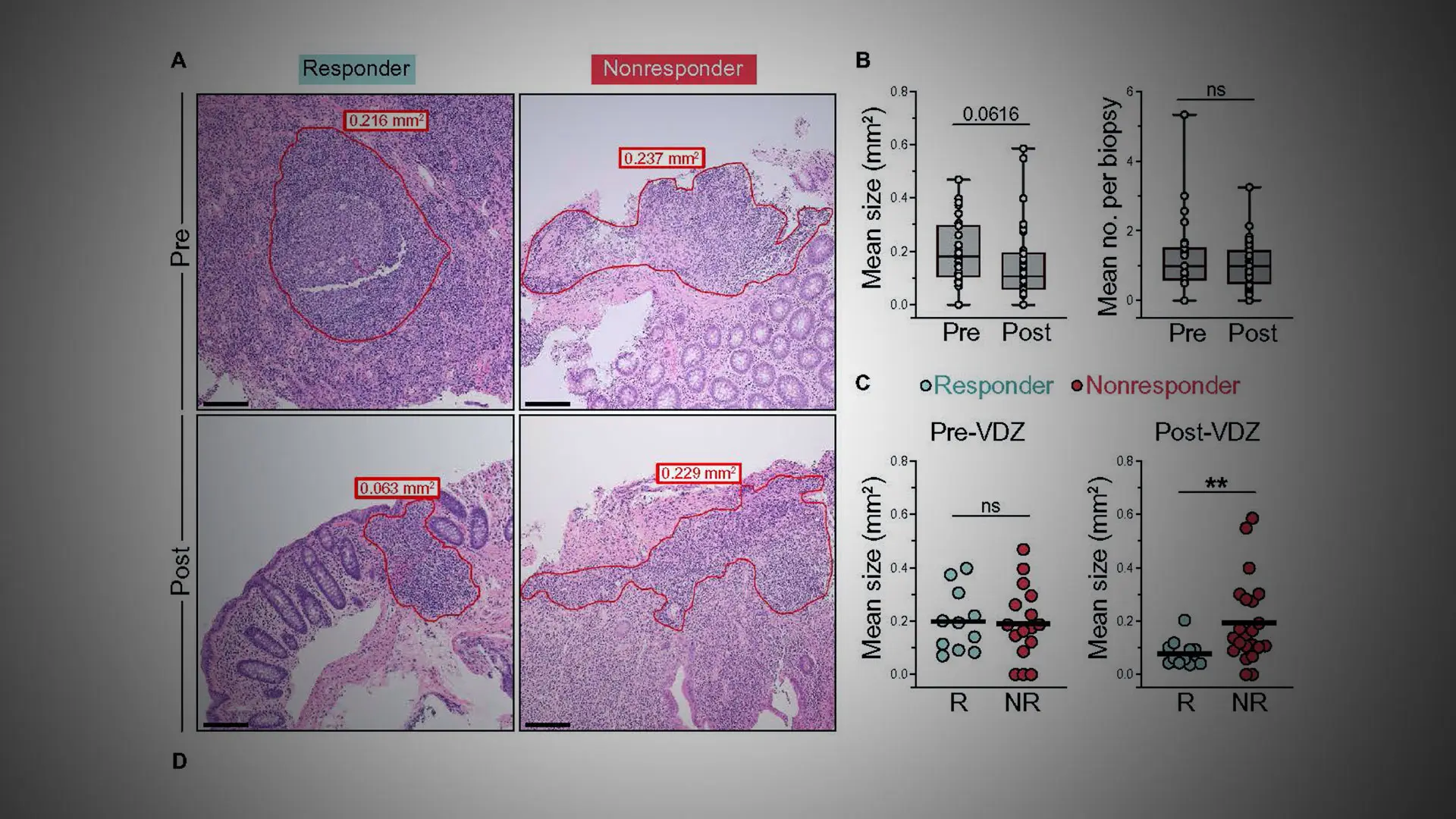Vedolizumab has joined the ranks of front-line drugs for managing ulcerative colitis (UC) even though scientists remain uncertain about its precise mechanism of action—a quandary that could hinder efforts to develop biomarkers to determine which inflammatory bowel disease (IBD) patients are most likely to benefit from this gut-selective medication.
Mount Sinai researchers have taken a significant step toward unraveling the mystery by describing the targeting of gut-associated lymphoid tissue (GALT) by vedolizumab as a previously overlooked mechanism of action. By blocking the integrin receptor α4β7 on the surface of white blood cells—including dendritic cells and T and B lymphocytes—vedolizumab prevents their entry into the lymphoid tissue, where they can drive chronic inflammation in people with UC, and most likely in those with Crohn’s disease as well. The mechanism was outlined in Science Immunology.
“The theory has been that vedolizumab only curtailed the migration of white cells into the intestinal lamina propria,” says Saurabh Mehandru, MD, Professor of Medicine (Gastroenterology) at the Icahn School of Medicine at Mount Sinai and senior author of the study. “We’ve now demonstrated that the drug prevents the entry of naïve B and T cells into the GALT, resulting in the loss of size and cellularity of these structures. Thus, the targeting of these immune inductive sites in the intestine represents a novel therapeutic paradigm for IBD care.”
These findings are expected to inform the development of biomarkers as well as other oral and parenteral agents targeting the α4β7-MAdCA M-1 therapeutic axis, an adhesion pathway expressed in intestinal blood vessel linings that vedolizumab is uniquely equipped to inhibit.
“Our latest research will give us an advantage in developing biomarkers that are based on real biology rather than studying how patients respond to different treatments based simply on assays,” explains Dr. Mehandru, who has led a lab on mucosal immunology for the past decade at Mount Sinai. “That effort involves a better understanding of how individual patients respond to IBD medicines based on differences in their gut-associated lymphoid tissue, which contributes significantly to their body’s immune strength.”

A) Representative hematoxylin and eosin staining of colonic biopsies from responder (R) and nonresponder (NR) patients with UC taken before and after VDZ therapy. Lymphoid aggregate (LA) border indicated with red line. Scale bars, 100 μm. (B) Mean LA size and number per biopsy from patients with UC pre- and post-VDZ therapy (cohort 2). Data are shown as box and whisker plots. (C) Comparison of LA size between VDZ responders and nonresponders in biopsies taken pre- and post-VDZ therapy.
In demonstrating that vedolizumab prevents a flood of potentially harmful immune cells from entering the GALT, researchers also reported another intriguing finding about the therapeutic agent’s mechanism of action. Specifically, they learned that barring these naïve cells from the gut also prevents them from receiving adaptive immunity training within the lymphoid tissue and emerging later on in their “trained” state as pernicious drivers of inflammation in the intestine of individuals with ulcerative colitis and Crohn’s disease.
“Our research continues to more fully understand how this very successful IBD medicine works so we can stratify patients to reap the greatest benefits through effective biomarkers,” emphasizes Dr. Mehandru. “By essentially going to the root of the inflammatory problem—the induction sites of immune response—we’re showing there is a logical progression to this investigative work, and that the scientific community needs to pay greater attention to the biology of the disease.”
Featured

Saurabh Mehandru, MD
Professor of Medicine (Gastroenterology)
